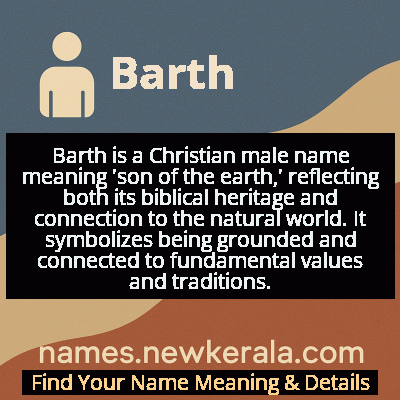Barth Name Meaning & Details
Origin, Popularity, Numerology Analysis & Name Meaning of Barth
Discover the origin, meaning, and cultural significance of the name BARTH. Delve into its historical roots and explore the lasting impact it has had on communities and traditions.
Name
Barth
Gender
Male
Origin
Christian
Lucky Number
4
Meaning of the Name - Barth
Barth is a Christian male name meaning 'son of the earth,' reflecting both its biblical heritage and connection to the natural world. It symbolizes being grounded and connected to fundamental values and traditions.
Barth - Complete Numerology Analysis
Your Numerology Number
Based on Pythagorean Numerology System
Ruling Planet
Uranus (Rahu)
Positive Nature
Strong sense of order, loyal, practical, and disciplined.
Negative Traits
Stubborn, overly serious, rigid, and prone to feeling restricted.
Lucky Colours
Blue, gray.
Lucky Days
Saturday.
Lucky Stones
Blue sapphire.
Harmony Numbers
1, 7, 8.
Best Suited Professions
Managers, engineers, accountants, organizers.
What People Like About You
Dependability, discipline, practicality.
Famous People Named Barth
Bartholomew the Apostle
Biblical Figure
One of the twelve apostles who spread Christianity to Armenia and India
Barthold Georg Niebuhr
Historian and Statesman
Founder of modern historical scholarship and critical Roman history
Barthélemy Catherine Joubert
Military General
French Revolutionary general with significant victories in Italy
Bartholomew Roberts
Pirate
Most successful pirate of Golden Age, captured over 400 ships
Name Variations & International Equivalents
Click on blue names to explore their detailed meanings. Gray names with will be available soon.
Cultural & Historical Significance
Throughout medieval Europe, Barth and its longer forms gained popularity as Christian names, particularly among farming communities where the literal meaning resonated with agricultural lifestyles. During the Protestant Reformation, the name maintained its popularity across both Catholic and Protestant traditions, though it saw particular favor in regions with strong agricultural economies. The name's enduring presence in Christian communities worldwide demonstrates its ability to bridge both religious significance and practical earthly connections.
Extended Personality Analysis
Individuals named Barth are often perceived as grounded, practical, and dependable—qualities that align with the name's meaning of 'son of the earth.' They tend to exhibit strong work ethics, patience, and a methodical approach to problem-solving, much like a farmer tending to crops. This earthy connection often manifests as stability, reliability, and a no-nonsense attitude that others find comforting and trustworthy.
Barths typically possess a quiet strength and resilience, able to weather life's challenges with fortitude. They often show deep loyalty to family and community, valuing tradition and continuity. While sometimes perceived as reserved or conservative, they usually have rich inner lives and strong moral compasses. Their practical wisdom and ability to remain steady during turbulent times make them natural leaders in their communities, though they often lead by example rather than seeking the spotlight.
Modern Usage & Popularity
In contemporary times, Barth remains a relatively uncommon but respected name, often chosen by parents seeking a name with strong Christian roots and earthy connotations. While its popularity peaked in the early 20th century, it has seen a modest revival in recent years as part of the trend toward traditional, meaningful names. The name is particularly popular in Christian communities that value biblical heritage, and it's often used as a formal alternative to the more casual 'Bart.' Current usage trends show it appearing more frequently in religious families, academic circles, and among those with agricultural backgrounds who appreciate its literal meaning.
Symbolic & Spiritual Meanings
Symbolically, Barth represents grounding, stability, and connection to fundamental realities. The 'son of the earth' meaning extends metaphorically to represent someone who is deeply rooted in tradition, family, and community values. It symbolizes fertility—not just in agricultural terms but in creativity, ideas, and relationships. The name carries connotations of patience and growth, reflecting the natural cycles of sowing and reaping, effort and reward. In spiritual contexts, it can represent the balance between earthly existence and spiritual aspiration, embodying the Christian concept of being 'in the world but not of it.'

